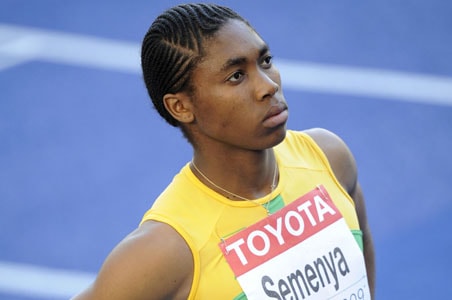
Sydney:
Gender tests on South African athlete Caster Semenya have found she is a hermaphrodite, an Australian newspaper reported on Friday, as a senior official admitted she may not be "100 percent" female.
Sydney's Daily Telegraph, citing an unnamed source involved in the tests on the world 800m champion, said she had both male and female sex organs and no womb or ovaries. "There certainly is evidence Semenya is a hermaphrodite," the source was quoted as saying.
Pierre Weiss, secretary-general of the International Association of Athletics Federations (IAAF), earlier told AFP that Semenya was "possibly between two sexes".
"It is clear that she is a woman but maybe not 100 percent," Weiss said, adding that the case would be decided by the IAAF executive council in November.
"We have to see if she has an advantage from her possibly being between two sexes compared to the others."
The furore has enraged South Africa's ruling African National Congress (ANC) party, which called testing the 18-year-old "sexist and racist".
The IAAF has said Semenya is unlikely to be stripped of her world title earned last month in Berlin, but confirmed four athletes in earlier cases were "asked to stop their career".
"The trouble is the IAAF now have the whole ANC (African National Congress party) and the whole of South Africa on their backs," the source said.
"Everything is going to have to be done absolutely by the book, no question of a challenge to the findings.
"The problem for us is to avoid it being an issue now which is very personal: of the organs being a hermaphrodite, of not being a 'real' woman. It's very dramatic."
Semenya, whose coach has quit over the controversy, has called the row "a joke" and undergone an image makeover in which she posed for a South African magazine.
"There's all sorts of scans you can do. This is why it's so complicated," the source said.
"In the past you used to do a gynaecological exam, blood test, chromosome test, whatever. That's why they (the findings) were challenged, because it's not quite so simple.
"So what they do now is they do everything, and then they can say look, not only has she got this, she's got that and the other."
Weiss admitted the IAAF was struggling to deal with the complex case, which will be decided at the November 20-21 executive council meeting.
"We still don't have all the results and those we do have must be submitted to experts for evaluation," he said.
"The problem we have today is to know whether we submit these results to experts from outside the IAAF or our own medical commission which meets in Monaco on October 16, or to the two panels."
He added: "We don't have any texts on this subject as we do for doping. There is no provision in our rules as to what our decision might be."
Sydney's Daily Telegraph, citing an unnamed source involved in the tests on the world 800m champion, said she had both male and female sex organs and no womb or ovaries. "There certainly is evidence Semenya is a hermaphrodite," the source was quoted as saying.
Pierre Weiss, secretary-general of the International Association of Athletics Federations (IAAF), earlier told AFP that Semenya was "possibly between two sexes".
"It is clear that she is a woman but maybe not 100 percent," Weiss said, adding that the case would be decided by the IAAF executive council in November.
"We have to see if she has an advantage from her possibly being between two sexes compared to the others."
The furore has enraged South Africa's ruling African National Congress (ANC) party, which called testing the 18-year-old "sexist and racist".
The IAAF has said Semenya is unlikely to be stripped of her world title earned last month in Berlin, but confirmed four athletes in earlier cases were "asked to stop their career".
"The trouble is the IAAF now have the whole ANC (African National Congress party) and the whole of South Africa on their backs," the source said.
"Everything is going to have to be done absolutely by the book, no question of a challenge to the findings.
"The problem for us is to avoid it being an issue now which is very personal: of the organs being a hermaphrodite, of not being a 'real' woman. It's very dramatic."
Semenya, whose coach has quit over the controversy, has called the row "a joke" and undergone an image makeover in which she posed for a South African magazine.
"There's all sorts of scans you can do. This is why it's so complicated," the source said.
"In the past you used to do a gynaecological exam, blood test, chromosome test, whatever. That's why they (the findings) were challenged, because it's not quite so simple.
"So what they do now is they do everything, and then they can say look, not only has she got this, she's got that and the other."
Weiss admitted the IAAF was struggling to deal with the complex case, which will be decided at the November 20-21 executive council meeting.
"We still don't have all the results and those we do have must be submitted to experts for evaluation," he said.
"The problem we have today is to know whether we submit these results to experts from outside the IAAF or our own medical commission which meets in Monaco on October 16, or to the two panels."
He added: "We don't have any texts on this subject as we do for doping. There is no provision in our rules as to what our decision might be."

